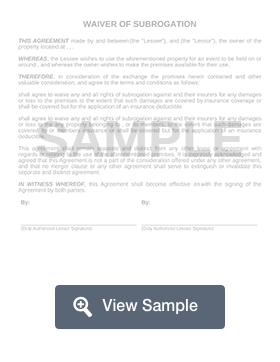Waiver of Subrogation Form
A Waiver of Subrogation is a legal document that relieves a party of liability for damages, even if they are partially responsible for the loss. If an individual signs a Waiver of Subrogation, they are relinquishing their right to sue a party, and are ultimately agreeing to accept whatever amount the insurance company decides to pay out. These types of agreements are used in various instances, from automotive to property coverage. This type of od agreement requires names and signatures from both parties and may be legally binding. Because of the binding facet of this agreement, it is imperative that an individual fully understands the waiver before signing it.
What Is a Waiver of Subrogation?
A Waiver of Subrogation is used in the insurance industry. It is a clause in a contract, but it can only be used once you have the right kind of insurance coverage. A subrogation provision is used to relieve a party of liability for damages if they are even partially responsible for a loss. However, if you sign a contract that contains this clause, you’re giving up your right to sue the provider and agreeing to accept whatever amount the insurance company agrees to pay out on your claim. A subrogation waiver may be used in general liability, workers' compensation, automobile, and property coverage contexts.
For example, let’s say that you signed a construction contract with Waiver of Subrogation clause involving a contractor who is remodeling your kitchen. If the contractor damaged something and you have waived your subrogation rights, you could file an insurance claim and get compensated, but you could not sue the contractor for the property damage. So, in short, subrogation prevents your ability to sue.
Because a Waiver of Subrogation clause may be a legally binding agreement, it must be completed in writing. Both parties must review the agreement before they sign it. It’s a good idea to have the document reviewed by a lawyer before signing so that you understand how the agreement would affect you if you were to sign it. Both parties must sign and date the agreement. It is also wise for the parties to sign the agreement in front of a notary public. This waiver can be used for a certain period of time or it can be permanent.
Components of a Waiver of Subrogation
A Waiver of Subrogation is a clause found within a contract. Generally, it will say that the person signing the contract agrees to not sue the service provider if damage or a loss occurs. Instead, the service provider’s liability insurance will assume responsibility for the loss and pay out on the claim. While it addresses both parties to the contract, the exact wording will vary depending on the scope of the contract.
Waiver of Subrogation for Landlords and Tenants
A Waiver of Subrogation can also be used in a rental agreement or lease agreement. When this clause is found in a lease or rental agreement, the insurance company that provides rental insurance to the tenant generally requires the tenant to pay a higher premium to cover the risk of any potential losses. The tenant’s renter’s policy would then cover more than just the contents of the rental unit. It would also pay out for injuries that occur to any guests on the property. Landlords who have a homeowner’s insurance policy for the property may also have a Waiver of Subrogation. So, the mutual waivers would mean that the tenant and landlord couldn’t sue each other, but they could make claims directly to the involved insurance carriers to recover any losses.
Legal Considerations
A Waiver of Subrogation may be a legally binding clause. If you sign a contract with this clause, you’re giving up your right to sue the provider of services and agreeing that you’ll accept whatever payout the insurance company provides for your loss. So, before you sign any contract, look for this clause. Read it carefully. Talk to a lawyer and determine the risk you may be taking by signing it.
How Do I Obtain a Waiver of Subrogation?
Talk to your insurance company to find out how you can obtain a Waiver of Subrogation. This is important because you may have to pay a higher premium to get this sort of coverage from your insurance company. Until you’ve gotten this special coverage from your insurance company, you should not use this clause within your contracts.

